We've teamed up with adidas Originals to tap into self-expression, originality, and community. We spent a day with ex NTS Breakfast Show host, founder of East London based independent radio, Do!!You!!!, and Goodhood hero, Charlie Bones. Charlie runs his radio show out of his Clapton studio Monday to Friday, with multiple hosts and guests every day, who all play music for the unified reason of connection and community. We spent a day with Charlie watching the show broadcast live, talking about being your authentic self and 'doing you', and we got the scoop on the "community centre" that he has built over decades of playing on the radio. Check it out below...
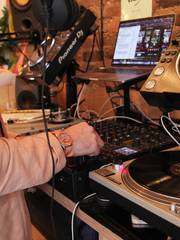
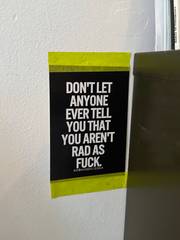
KYLE STEWART: Thanks for being the soundtrack to our office for the past 10 years.
CHARLIE BONES: Thank you very much.
KS: You grew up in Reading right? What was that like?
CB: Horrible.
KS: Why?
CB: You know, these small towns that all centre around the shopping mall and... I don't know, it was very violent, it didn't have the scope of London. You know, the freedom you get in London, just to be able to walk around and do your thing. It's too big and too busy for any nonsense. It's ironic, because all my friends from back in Reading are terrified of London. When I was younger, I knew I was coming to London as soon as I could. There were just really amazing things, like Record Basement was there, which was pressing a lot of jungle at that time. Quite a strong scene of weird electronica. A lot of interesting things were happening.
KS: Did you skate?
CB: Yeah, skating was my number one love of my life. I just didn't live in town, I was on the outskirts. So all my friends were getting better and better and every weekend I'd stay at the same level. It was so frustrating, but I loved it more than anything. I still remember the first skateboard I had, I loved it.
"THE FREEDOM YOU GET IN LONDON, JUST TO BE ABLE TO WALK AROUND DOING YOUR THING"
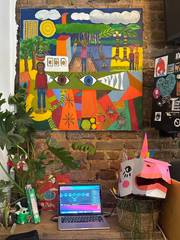
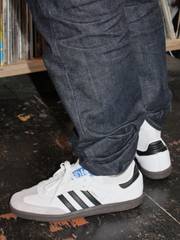
KS: What did you get from skating?
CB: It was amazing, there's so many legendary characters. Some of them weren't very friendly, and some of them were, it was almost like a record store or the DJ world in that way. It was quite 'strict hierarchies', but everybody was doing their thing, quite odd and eccentric. Lots of house parties, just absolute chaos and constant, almost jackass level nonsense going on all the time. And then this spread out in graffiti and DJing, it was kind of like a tribe. Trips to London when I was 11 or 12 with them, skating Liverpool Street or South Bank, it was just amazing. Days out, finding spots and skate shops. Dealing with all that grouchiness, set me up for dealing with record shops, haha.
KS: How do you think culture and community has changed since Y2K? Do you feel we pivoted to a different sense of reality? Do you have any nostalgia for that time, for that era? Do you think it's got better?
CB: Definitely all atomised I think. Even my own life, moving to London from Reading and doing what I do, I've essentially built myself my own community centre. That was always the idea, to just get a group of people around that I really like. I grew up quite isolated in Reading, it was a whole heap of logistics and headache. There was one bus a day where I lived, so you couldn't get anywhere. I love the idea of people just hanging out, which I can do easily in London now. It's really nice, because I haven't experienced that on all the radio stations I've been on, there wasn't really necessarily any reason, it was all very independent still. But even on the pirate stations we'd have a staff meeting, and they didn't like me because I didn't stick to the exact script. I like building a space where we get a band of people together in a chat show, doing their thing... That's the idea of radio to me. That's why I do radio - not for myself. It was to get on and meet the people that I grew up listening to. Radio is quite tricky, because I think you have to be yourself. When I first started doing radio with a chatroom from my flat, it blew up, it brought together all these people that only knew me and not each other, and everyone loved it. We all worked together, and I thought, "this is it," you know? Basically I'm trying to engineer my own little world, and get the right people. Plastic People on Curtain Road in Shoreditch was an incredible place for finding people.
"BUILDING A SPACE WHERE WE GET A BAND OF PEOPLE TOGETHER IN A CHAT SHOW, DOING THEIR THING... THAT'S THE IDEA OF RADIO TO ME"
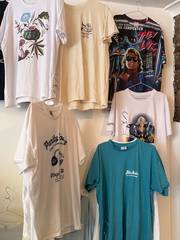
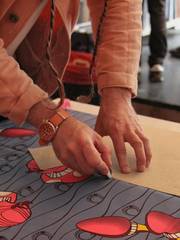
KS: So you were DJing there [at Plastic People] when we had the store next door?
CB: Yeah! Maybe few years before Goodhood moved to Curtain Road. That was always the place I tell people when they ask me "do you know where to go out?" I would say Plastic People. Pretty transcendent experience, you walked in there and you could just feel music come through you. People would come up to you and say "oh my God this is the best thing I've ever heard in my life", and I'd say "I'll give you another three records that will change your life". The vision was to just get every weirdo coming in, those sorts of clubs are always the best, when you can meet and talk to great people. That's something I always tell my hosts too, that you have to talk to people when you're on air. You can't just come in a mix records for two hours and think you're going to change the world. It's more about engaging with the people and once you connect, it really works. You can hear one DJ play one tune and not like it. then you can hear another DJ play it and love it.
KS: What was the record that changed your life?
CB: I don't know, my Mum and Dad played really kind of melancholy music when I was young… Maybe Tracy Chapman's "Behind the Wall". Just hardcore acapella about domestic abuse, police not showing up. You know, it just sets you on another axis. That and "Tom’s Diner" with Suzanne Vega. Just sonically... Just really deep, but very rolling. The records you play have got a certain sonic quality to them. I like those records, and "Love Is Everywhere" by Pharoah Sanders, just really deep, but very rolling.
KS: Did you discover those records through your parents?
CB: Not Pharoah Sanders, but I wish. Tracy Chapman through my dad. Even Prince, I didn't really hear him till I was, 14 or 15, and he was getting played on some awful radio I used to listen to when I was a kid. The Most Beautiful Girl in the World came on, and it's still sonic. And it's funny, because that's the track that my daughter just got obsessed with it as a child. I love the fact that you can hear a record and you have no idea how they actually achieved it. What you build in your mind visually, versus actually being in a studio, Kate Bush is amazing at that, you know? Not telling anyone her production techniques, and she's a real studio boss. It's top secret, isn't it? I always think to the first time I heard "Watermelon Man" by Herbie Hancock. These amazing tunes that just send you off into another world. I think if a record doesn't do that, it's not a good record. It has to take you somewhere.
"YOU CAN'T JUST COME IN AND MIX RECORDS FOR TWO HOURS AND THINK YOU'RE GOING TO CHANGE THE WORLD, IT'S MORE ABOUT ENGAGING WITH PEOPLE"
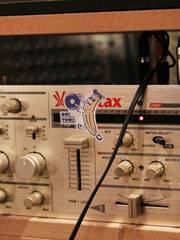
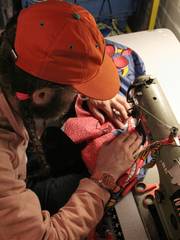
KS: What does community mean to you?
CB: Respect and boundaries, I’m very strict on that. It's very hard having to explain someone's simple modes of being, you know? I'm very used to having to over-explain myself and being told, "oh, shut up, you're talking nonsense.” So it's really amazing to be with these people that really get what we're doing and really love it and I’m like, "this is the happiest I am all week.” When you find the right people and they get it, it’s really nice. They all like and respect each other, you know? I’m not used to that either. All those little details of just getting through a day with no drama and everybody’s very happy that it works.
KS: Is that what you're aiming for with Do!!You!!!?
CB: I think so. It took me a long time to get self-belief. It was a big leap of faith, you know? I don't think I could have done it before. I remember when I was at NTS Radio and Tate had us come and do something there and, I walked into those oil drum rooms, a really vast space, quite intimidating. I said to Femi [NTS Radio founder], "man, this is unreal.” And he was like, “what?", and I was like, "how do you even have the mindset to like believe that these people should be listening to Tate?”. It was very inspiring. He really just went up and up, it's amazing to watch. Even now, I don’t think I could imagine that sort of level. I like to keep things more, you know... If I like a restaurant, I will go there all the time and eat the same thing. I'm not saying anything wrong with breaking through, but I'm quite happy with keeping things very sort of down to earth and simple and sustainable. But still, it blew my mind and I wish I had a little bit more of that.
KS: I was fascinated and when you told me the subscription kind of thing you have for Do!!You!!!. The fact that you can listen for free, but if you’ve got the money, you can pay. That's got the potential to change the way things go.
CB: It's absolutely overwhelming now when I think about it. But that was built up from years and years of trust of just doing the work, you just have to be there. I've tried to explain that to a lot of some of the DJs and other people. I’m doing an evening show on a Monday now and it's so good. It's so nice to be playing in the evening, it's much freer. This is great radio, but not many people are listening. It's not in their routine. You have to take ages to sort of be there and be dependable. People go and come and they listen and they might not listen for a year and then they might come back and, you know, you've got to be there.
"THAT [CHARLIE'S DO!! YOU!!! RADIO COMMUNITY] WAS BUILT UP FROM YEARS AND YEARS OF TRUST AND JUST DOING THE WORK, YOU JUST HAVE TO BE THERE"
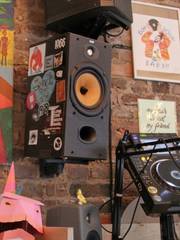
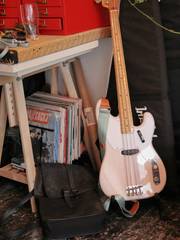
KS: And you mentioned the Pirate radio thing earlier…
CB: I remember when I first used to come down to London, you put the radio on and you’d find a pirate radio station. That's just people broadcasting, there's no feedback mechanism. With the online show [chatroom], it’s amazing.
KS: How does that, your direct community in the chatroom, influence you?
CB: It's a gift and a curse, but I do think it’s amazing. I would push my listeners to get it, and then it just becomes this big beast, you know. It’s really great, but it can go off the rails very easily. Someone had it the other day and said something and it's not necessarily even the host saying it, it's even just reading a fact from somewhere. A host read a statistic that said it’s women that are more likely to cheat in marriages, something like that, and the chatroom went off. So it can be quite, you know... If you if they sense weakness, they will go for you.
KS: If you could give a message to your community, what is it?
CB: Do you. It's funny because a friend just got it the other way. He said, oh my god, it means be you, do your thing, you know, be yourself. He was like, oh I get it. Then he went on a big thing on air saying it.
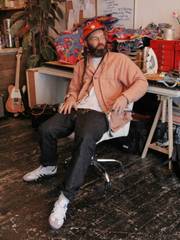
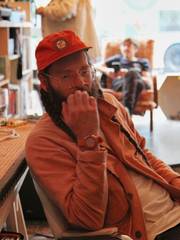
KS: And you don’t explain your own thing?
CB: It's worked for me - not conforming. You know, me and the offices did not go well, I did all kinds of office jobs a long time ago. I guess anytime you come up against some manager that’s not making any sense, it won't go well. I don't say anything in particular, they just spot it. I did a lot of temp work, and in those scenarios you go into this little ecosystem that is ordered, and you're sort of ritually humiliated by being given the worst job and the fact that you aren't desperate for approval. That really sets tyrants off. So there was a lot of getting fired because I was not angry enough being made to be a door holder at a shop. Being in all these environments, you know, I’m not good in school. That kind of power dynamic.
KS: Do you want to tell us about the boxers you make?
CB: I really like making things. Radio is a very ephemeral, strange thing. It vanishes almost as soon as it’s happened. It’s a bit of a shame there is an archive because it is quite nice, that sort of frisson of live radio that once it’s gone, it's gone unless you’ve taped it on a cassette, which I used to do. It's very strange really, radio. I understand big pop stars and rock stars coming off stage in a state. It fries you. It is the easiest thing for someone that doesn't do it. It's sort of like giving a speech at work, you know, like doing a work talk in front of the wheel also driving eight hours. It's this strange sort of exhaustion that’s hard to explain. It’s really funny because I've got friends who are like, oh shut up. At work you just hang out with friends and play music you like, but then you drag them on with you and they have a meltdown. They have a breakdown. They go, oh my God, this is insane. So it is nice to be sewing and making boxers. I love music, but it really weirds me out how it doesn't really exist. You know what I mean? It's very subjective. And these boxers are objective. You can see them, you can touch them, people love them. I'm happy just making them for myself, but if people want to buy them, then it’s great. They send me lovely messages, so it's nice. We want to be making more and more things in here.
KS: Do you have hope for the generation that you're bringing up via Radio that they can change things, they can become aware through your knowledge and wisdom?
CB: I do. I think it’s always a percentage. You’ve got to have hope in them, I see it. I love reading comments anywhere online. Back in the day, the radio was one person speaking against what was being said. And now it’s completely the other way. Like I saw Nancy Pelosi’s Twitter, she had written something about, you know, remembering someday or whatever. And just everyone was rinsing her. You know, there was like two people saying thank you for your service, you’re a wonderful politician. The rest were like, you corrupt motherfucker.
KS: Thanks Charlie.






